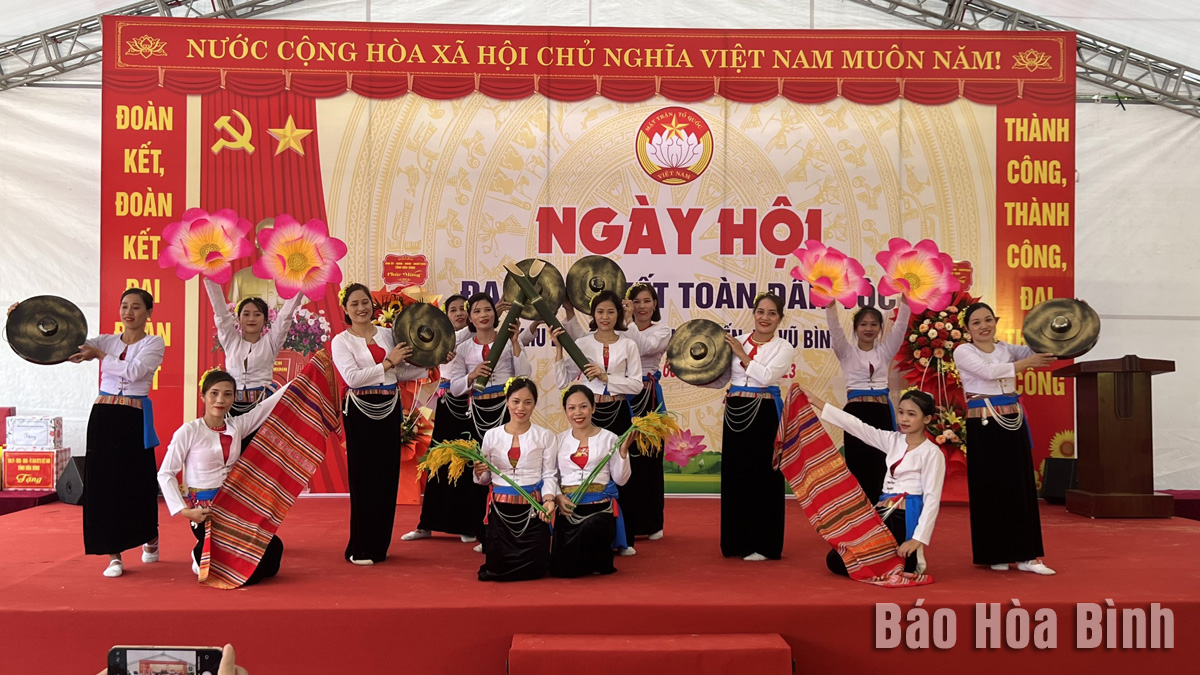
Located about 9km from the centre of Lac Son district, Vu Binh commune is home to 20 hamlets with 2,581 households and 11,925 people, more than 90% of whom are Muong ethnic people. Implementing the movement of "All people stay united to build a civilised lifestyle”, it has obtained many encouraging results, thus contributing to local socio-economic development.
Residents in Quyet Tien hamlet of Vu Binh commune (Lac
Son district) join in a singing and dancing performance at the Great National
Solidarity Festival.
Chairman of the communal People’s Committee Bui
Van Dan said that over the recent past, Vu Binh has encouraged locals to
strongly take part in emulation movements, comply with the Party and State’s
guidelines, policies and laws, develop livelihoods, and preserve traditional
culture.
In 2023, all the 20 hamlets were recognised as
"residential zones of culture” and 2,267 of the 2,581 households as "households
of culture”, equivalent to 87.8%. Among them, 716 households, or over 27.7%,
obtained the title for three consecutive years.
Movements and campaigns have been carried out
with diverse contents and in various forms, helping promote the strength of the
great national solidarity, give a facelift to rural areas, and improve people’s
life quality. Outstanding movements and campaigns include those calling for
solidarity in building new-style countryside and civilised urban areas,
encouraging farmers to boost agricultural production and trade, assisting the
youth to start careers, and engaging war veterans in the building of new-style
rural areas. As a result, many effective crop cultivation, animal farming, and
handicraft production models have taken shape, generating good profit and
income for people, Dan noted.
In addition, the commune has paid attention to
repairing and upgrading roads and mobilising local residents’ participation in
cleaning roads and dredging gutters. Partly supported with resources from the
public, it has completed concreting the roads within and linking many hamlets.
People’s consensus and all-level authorities’ attention have helped Vu Binh
make considerable improvement and better people’s life quality.
So far, the rate of concreted roads across
hamlets has reached 80.5% while concreted and paved canals and ditches now
account for 67.08%. There are no longer makeshift houses in the commune. Per
capita average income this year is estimated at 48 million VND (nearly 2,000
USD) while the multidimensional household poverty rate has been brought down to
12.8%. All local households have also gained access to hygienic water and the
national power grid.
Besides, cultural and social aspects have
recorded improvement, the political system been ensured, and security and
social order firmly maintained. Cultural, musical, and sport activities have
also been held frequently, helping better people’s spiritual life, according to
the official.
Phong Phu commune, Tan Lac district of Hoa Binh province, is widely regarded as the cultural heartland of the Muong ethnic group. Among its many traditional communities, Luy Ai hamlet (formerly Ai hamlet) stands out as a rare location where the customs and way of life of the Muong Bi people remain largely intact.
The Truong Kha temple festival, a distinctive cultural event held every three years in Vu Ban township, Lac Son district, returned recently with vibrant rituals and folk traditions of the Muong people. Located next to the Buoi River in the Muong Trao fields, the Truong Kha Temple is dedicated to the three Kun Dol deities, revered for teaching farming techniques, irrigation, weaving, and protecting the harvest.
The demand for spaces serving community activities of residents in various areas across Hoa Binh city has been satisfied as local cultural houses now feature modern, spacious facilities thanks to the effective implementation of Resolution No. 49/NQ-HDND issued on December 28, 2021 by the city People's Council, which approved the plan for reorganising, converting, and allocating land for the construction, repair, and expansion of cultural houses in Hoa Binh’s villages and residential areas until 2025.
At the end of May, the Hoa Binh Provincial Ethnic Arts Troupe organized a series of performances for residents in Region 2 and Region 3 communes across the province. Bringing art to ethnic communities in remote, isolated, and especially disadvantaged areas has become a meaningful activity. These are not merely artistic performances but also journeys to disseminate cultural values, enrich spiritual life, and contribute to preserving the cultural identity of ethnic minorities.



